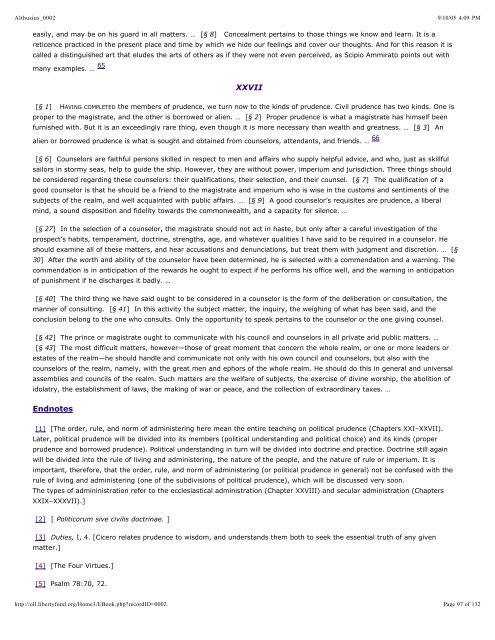Johannes Althusius: Politica - Hubertlerch.com - HubertLerch.com
Johannes Althusius: Politica - Hubertlerch.com - HubertLerch.com
Johannes Althusius: Politica - Hubertlerch.com - HubertLerch.com
You also want an ePaper? Increase the reach of your titles
YUMPU automatically turns print PDFs into web optimized ePapers that Google loves.
<strong>Althusius</strong>_0002<br />
9/10/05 4:09 PM<br />
easily, and may be on his guard in all matters. … [§ 8] Concealment pertains to those things we know and learn. It is a<br />
reticence practiced in the present place and time by which we hide our feelings and cover our thoughts. And for this reason it is<br />
called a distinguished art that eludes the arts of others as if they were not even perceived, as Scipio Ammirato points out with<br />
many examples. …<br />
65<br />
XXVII<br />
[§ 1] HAVING COMPLETED the members of prudence, we turn now to the kinds of prudence. Civil prudence has two kinds. One is<br />
proper to the magistrate, and the other is borrowed or alien. … [§ 2] Proper prudence is what a magistrate has himself been<br />
furnished with. But it is an exceedingly rare thing, even though it is more necessary than wealth and greatness. … [§ 3] An<br />
alien or borrowed prudence is what is sought and obtained from counselors, attendants, and friends. …<br />
66<br />
[§ 6] Counselors are faithful persons skilled in respect to men and affairs who supply helpful advice, and who, just as skillful<br />
sailors in stormy seas, help to guide the ship. However, they are without power, imperium and jurisdiction. Three things should<br />
be considered regarding these counselors: their qualifications, their selection, and their counsel. [§ 7] The qualification of a<br />
good counselor is that he should be a friend to the magistrate and imperium who is wise in the customs and sentiments of the<br />
subjects of the realm, and well acquainted with public affairs. … [§ 9] A good counselor’s requisites are prudence, a liberal<br />
mind, a sound disposition and fidelity towards the <strong>com</strong>monwealth, and a capacity for silence. …<br />
[§ 27] In the selection of a counselor, the magistrate should not act in haste, but only after a careful investigation of the<br />
prospect’s habits, temperament, doctrine, strengths, age, and whatever qualities I have said to be required in a counselor. He<br />
should examine all of these matters, and hear accusations and denunciations, but treat them with judgment and discretion. … [§<br />
30] After the worth and ability of the counselor have been determined, he is selected with a <strong>com</strong>mendation and a warning. The<br />
<strong>com</strong>mendation is in anticipation of the rewards he ought to expect if he performs his office well, and the warning in anticipation<br />
of punishment if he discharges it badly. …<br />
[§ 40] The third thing we have said ought to be considered in a counselor is the form of the deliberation or consultation, the<br />
manner of consulting. [§ 41] In this activity the subject matter, the inquiry, the weighing of what has been said, and the<br />
conclusion belong to the one who consults. Only the opportunity to speak pertains to the counselor or the one giving counsel.<br />
[§ 42] The prince or magistrate ought to <strong>com</strong>municate with his council and counselors in all private arid public matters. …<br />
[§ 43] The most difficult matters, however—those of great moment that concern the whole realm, or one or more leaders or<br />
estates of the realm—he should handle and <strong>com</strong>municate not only with his own council and counselors, but also with the<br />
counselors of the realm, namely, with the great men and ephors of the whole realm. He should do this in general and universal<br />
assemblies and councils of the realm. Such matters are the welfare of subjects, the exercise of divine worship, the abolition of<br />
idolatry, the establishment of laws, the making of war or peace, and the collection of extraordinary taxes. …<br />
Endnotes<br />
[1]<br />
[The order, rule, and norm of administering here mean the entire teaching on political prudence (Chapters XXI–XXVII).<br />
Later, political prudence will be divided into its members (political understanding and political choice) and its kinds (proper<br />
prudence and borrowed prudence). <strong>Politica</strong>l understanding in turn will be divided into doctrine and practice. Doctrine still again<br />
will be divided into the rule of living and administering, the nature of the people, and the nature of rule or imperium. It is<br />
important, therefore, that the order, rule, and norm of administering (or political prudence in general) not be confused with the<br />
rule of living and administering (one of the subdivisions of political prudence), which will be discussed very soon.<br />
The types of admininistration refer to the ecclesiastical administration (Chapter XXVIII) and secular administration (Chapters<br />
XXIX–XXXVII).]<br />
[2] [ Politicorum sive civilis doctrinae. ]<br />
[3] Duties, I, 4. [Cicero relates prudence to wisdom, and understands them both to seek the essential truth of any given<br />
matter.]<br />
[4]<br />
[5]<br />
[The Four Virtues.]<br />
Psalm 78:70, 72.<br />
http://oll.libertyfund.org/Home3/EBook.php?recordID=0002<br />
Page 97 of 132







